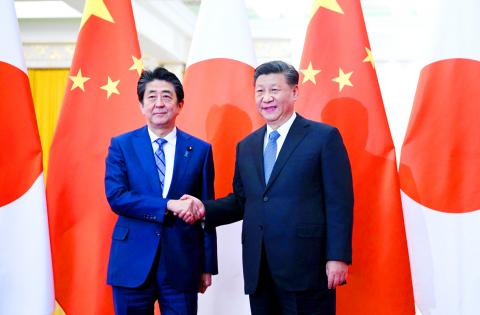As China struggles to deal with the slowdown of the world’s second-largest economy, it has embarked on a new strategy of placing financial experts in provinces to manage risks and rebuild regional economies.
Since last year, Chinese President Xi Jinping (習近平) has put 12 former executives at state-run financial institutions or regulators in top posts across the nation’s 31 provinces, regions and municipalities, including some who have grappled with banking and debt difficulties that have raised fears of a financial meltdown.
Only two top provincial officials had such financial background before the last leadership reshuffle in 2012, according to Reuters research.

Photo: AFP
Among the experts promoted is Beijing Vice Mayor Yin Yong (應勇) a former deputy central bank governor, and Shandong Deputy Provincial Governor Liu Qiang (劉強), who rose through the nation’s biggest commercial banks, from Agricultural Bank of China (中國農業銀行) to Bank of China (中國銀行).
Another newly promoted official, Chongqing Vice Mayor Li Bo (李波), had until this year led the central bank’s monetary policy department.
The appointments — overseeing economies larger than those of small countries — would appear to put those officials in the fast lane as China prepares a personnel reshuffle in 2022, when about half of the 25 members of the Politburo could be replaced, including Chinese Vice Premier Liu He (劉鶴), who is leading economic reform while doubling as chief negotiator in trade talks with the US.
“Bankers are now in demand, as local governments are increasingly exposed to financial risks,” said Feng Chucheng, a partner at Plenum, an independent research platform in Hong Kong.
“These ex-bankers and regulators are given the task of preventing and mitigating major financial risks,” he said.
The appointments have come as economic growth has slowed to its weakest in nearly three decades, while government infrastructure investment has fallen.
Five regional banks were hit with management or liquidity problem this year, raising the prospect of devastating debt bombs lurking in unexpected corners.
“We need to be well-prepared with contingency plans,” Xinhua news agency said after a major annual economic meeting headed by Xi this month.
The economy faced “increasing downward economic pressure amid intertwined structural, institutional and cyclical problems,” it said.
With pressures mounting, local governments are expecting to take the lead in managing their financial scares and cutting the cost of rescue with local intervention, analysts said.
“Appointing financial vice governors to provinces can help better integrate financial policies into local practice, and to prevent financial risks beforehand,” said He Haifeng (何海峰), director of Institute of Financial Policy at the Chinese Academy of Social Science, a government think tank.
“Such appointments have also showcased a change of manner in official appointments,” He said.
Financial executives were long shunned for leadership positions.
Banks were nationalized after the Chinese Communist Party took power in 1949 and many bankers were purged during the Cultural Revolution.
Xi started to stress the importance of financial expertise and to elevate the status of executives in 2017.
“Political cadres, especially the senior ones, must work hard to learn financial knowledge and be familiar with financial sectors,” Xi said in a national meeting on financial affairs.
Half of the 12 former financial executives elevated to provincial leadership posts under Xi were born after 1970.
Liaoning Vice Governor Zhang Lilin ( 張酈林), 48, a veteran banker who spent two decades in the nation’s third-largest lender, Agricultural Bank of China, was appointed days after three state-controlled financial institutions announced investment in the then-troubled Bank of Jinzhou (錦州銀行).

Intel Corp chief executive officer Lip-Bu Tan (陳立武) is expected to meet with Taiwanese suppliers next month in conjunction with the opening of the Computex Taipei trade show, supply chain sources said on Monday. The visit, the first for Tan to Taiwan since assuming his new post last month, would be aimed at enhancing Intel’s ties with suppliers in Taiwan as he attempts to help turn around the struggling US chipmaker, the sources said. Tan is to hold a banquet to celebrate Intel’s 40-year presence in Taiwan before Computex opens on May 20 and invite dozens of Taiwanese suppliers to exchange views

Application-specific integrated circuit designer Faraday Technology Corp (智原) yesterday said that although revenue this quarter would decline 30 percent from last quarter, it retained its full-year forecast of revenue growth of 100 percent. The company attributed the quarterly drop to a slowdown in customers’ production of chips using Faraday’s advanced packaging technology. The company is still confident about its revenue growth this year, given its strong “design-win” — or the projects it won to help customers design their chips, Faraday president Steve Wang (王國雍) told an online earnings conference. “The design-win this year is better than we expected. We believe we will win

Chizuko Kimura has become the first female sushi chef in the world to win a Michelin star, fulfilling a promise she made to her dying husband to continue his legacy. The 54-year-old Japanese chef regained the Michelin star her late husband, Shunei Kimura, won three years ago for their Sushi Shunei restaurant in Paris. For Shunei Kimura, the star was a dream come true. However, the joy was short-lived. He died from cancer just three months later in June 2022. He was 65. The following year, the restaurant in the heart of Montmartre lost its star rating. Chizuko Kimura insisted that the new star is still down

While China’s leaders use their economic and political might to fight US President Donald Trump’s trade war “to the end,” its army of social media soldiers are embarking on a more humorous campaign online. Trump’s tariff blitz has seen Washington and Beijing impose eye-watering duties on imports from the other, fanning a standoff between the economic superpowers that has sparked global recession fears and sent markets into a tailspin. Trump says his policy is a response to years of being “ripped off” by other countries and aims to bring manufacturing to the US, forcing companies to employ US workers. However, China’s online warriors